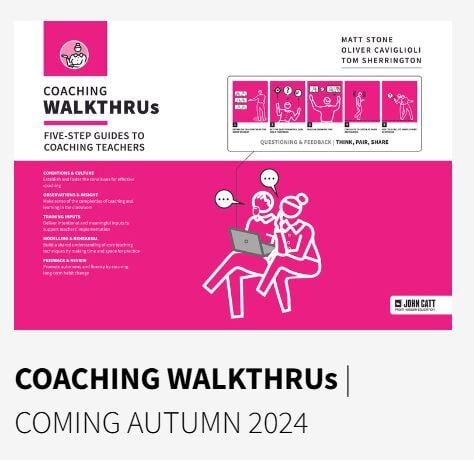Update for Phase 1 and AOR Trainees
Update for Phase 2 (PGCE) Trainees
Congratulations!
Firstly, a HUGE congratulations to those of you who started your PGCE in January 2024 for completing the course! Yours was the very first cohort to experience Intensive Training & Practice days as part of NITE's pilot rollout of this, so you've been at the vanguard of Initial Teacher Training all year, which is an exceptional achievement - well done to all of you for your incredible hard work!
|
Next month, we'll be providing you with some resources to further develop your questioning skills.
Utilising your Holidays Christmas holidays are the perfect time for you to rest, unwind and recharge ahead of the new calendar year and the next two terms: those of you starting your ECT positions, this also offers an opportunity to read up on what you can expect as a QTS Teacher for your first 1-2 years, and familiarise yourself with what's to come. For those of you who are about to complete your first or second terms: reflect on your progress since September and celebrate the prospect of successfully completing what is often the hardest term of your Initial Teacher Training period. Autumn brings illnesses, absences and minimal daylight, so in these final three weeks, be extra conscious of your wellbeing and try to take the time to support your colleagues as much as possible. Do also use the opportunity to catch up on any outstanding work so that next term can be all about next term, but make sure you're blocking out 'downtime'. |

Update for Phase 1 and AOR In-School Mentors (ISMs)
Equipping Trainees with High-Quality Skills for Effective Lesson Planning
Over the past few weeks, the trainees have been engaged in completing a Grad2Teach online course on Lesson Planning while also participating in a Teaching, Learning, and Assessment (TLA) session dedicated to mastering the challenging task of how to plan effective lessons. Our TLA and online course have been aligned with Standard 4 of the Core Content Framework: "To plan and teach well-structured lessons."
At the heart of our training, we emphasise that lessons are more than a series of activities; they are carefully sequenced experiences designed to develop pupils' knowledge, skills and understanding. Furthermore, effective lesson planning should enable the teacher to engage their students and foster their independent thinking.
Trainees have learned that effective teaching begins with understanding their learners' prior knowledge and crafting a cohesive plan that introduces new material step-by-step. They have also been developing skills in demonstrating processes, breaking down complex or abstract concepts and narrating their thought processes to effectively scaffold students' understanding.
Through targeted practice and reflection, they have developed techniques for using questioning to stimulate thinking, assess pupils' understanding and foster meaningful discussions. Emphasis is placed on providing pupils with ample practice time and encouraging trainees to prioritise reinforcing and building on prior learning, rather than constantly introducing new material.
Lesson planning training at Grad2Teach integrates strategies like metacognition, where trainees model problem-solving processes and guide students in self-reflection on their learning steps. Sequencing and dual coding — combining visuals with verbal explanations — further enrich the planning process, making lessons memorable and accessible for all learners. With these techniques, our trainees are not just planning lessons, they are learning to develop their ability to craft transformative learning experiences that empower their pupils to succeed.
Update for Phase 2 (PGCE) In-School Mentors180-degree Turn on Training As of Wednesday 13 November, the 20-hour mentor training requirement set by the DfE has been officially SCRAPPED! We feel this is a hugely positive decision made swiftly by the Department for Education as feedback has suggested that training requirements for mentors were 'excessive' and posed a 'significant problem' for both providers and schools. Importantly, funding can be claimed for any training that had already been completed prior to 13 November, so this has not gone to waste and we sincerely hope that any training already completed has been beneficial. Equally, those of you who wish to continue training throughout the year can do so with our partner, NITE, by accessing their NASBTT courses online. If you're unsure how to access these, please reach out to Alex at alexb@grad2teach.ac.uk at any time. However, please note that there is no longer a requirement to complete a certain amount. Mentors are still expected to complete the mandatory minimum training requirements, including Onboarding/Induction training, but this is back to what you would have experienced previously. We at Grad2Teach are warmly welcoming this change but do want to take this opportunity to thank you for all your incredible work supporting our trainees whilst managing this high load of training - what you do is exceptional and can often be overlooked, especially by people outside education or the ITT 'sphere' - so thank you all so much. Here's wishing you all a successful final few weeks of term!
|
|
|
Update from the Partnerships Team
Starting Strong: Advice for Beginning your Placement
Beginning a placement at a new school is an exciting step in your journey as a trainee teacher. To make the most of this opportunity, it’s essential to focus on key priorities that will help you integrate into the school community and set a solid foundation for success.
1. Understand the School’s Culture
Take time to familiarise yourself with the school’s ethos, policies, and routines. This includes understanding behaviour management strategies, safeguarding procedures and the curriculum. Observe how staff interact with students and one another to align with the school's professional standards.
2. Build Relationships
Form positive connections with colleagues, mentors and students. Introduce yourself to staff members, seek guidance from your mentor and actively participate in team meetings. Not forgetting that the Main School Office, IT Support, Behaviour Management and SEND Team, as well as Catering Team are all very important connections to make too. Building rapport with students is equally vital; showing interest in their learning will foster trust and engagement.
3. Be Organised and Prepared
Plan lessons meticulously, keeping them adaptable to meet students' diverse needs. Familiarise yourself with available resources and use them effectively. Organisation not only boosts your confidence but also demonstrates professionalism.
4. Seek and Reflect on Feedback
Feedback is key to growth. Regularly seek constructive input from your mentor and peers and reflect on your teaching practices to make improvements.
Approaching your placement with enthusiasm, adaptability and a commitment to learning will ensure a rewarding experience.
Update Grad2Teach Alumni TraineesCPD Guidance, Research and Resources for Teaching Practice and Leadership Aspirations: Spotlight on Tom Sherrington |
|
This is probably just a reminder for many of you; however, Tom Sherrington is always an excellent reference point to develop your teaching practice. From his website, Teacherhead, you can access superb workshops and masterclasses online (e.g., "Rosenshine’s Masterclass") and featured articles and blogs (e.g., "Cold Calling," and "10 Things: Establishing Expectations with a New Class").
You can also listen to Tom Sherrington explain best practices and pedagogy in his Kitchen Pedagogy videos — and yes, he really is in a kitchen. Just Google "Kitchen Pedagogy Tom Sherrington," and you will find many informative short videos to enhance your teaching practice. |
 |
|
Linked to the teaching practice section is Tom Sherrington’s book titled Teaching Walkthrus: Five-Step Guide to Instructional Coaching, co-authored with Oliver Caviglioli. Don’t be fooled by the title, as it is not just about coaching and leadership, but also contains 50 strategies for the classroom. Dylan Wiliam writes in the quotes section of the book: “It is a beautifully illustrated tour of the most important things to be thinking about in teaching and the leadership of teaching.”
If you aspire to become a middle leader, this book provides insights into what middle and senior leaders will be looking for when completing lesson observations, learning walks, or 'walkthrus' (as the title suggests). This book will improve your own practice and support your development into middle leadership roles.
|

